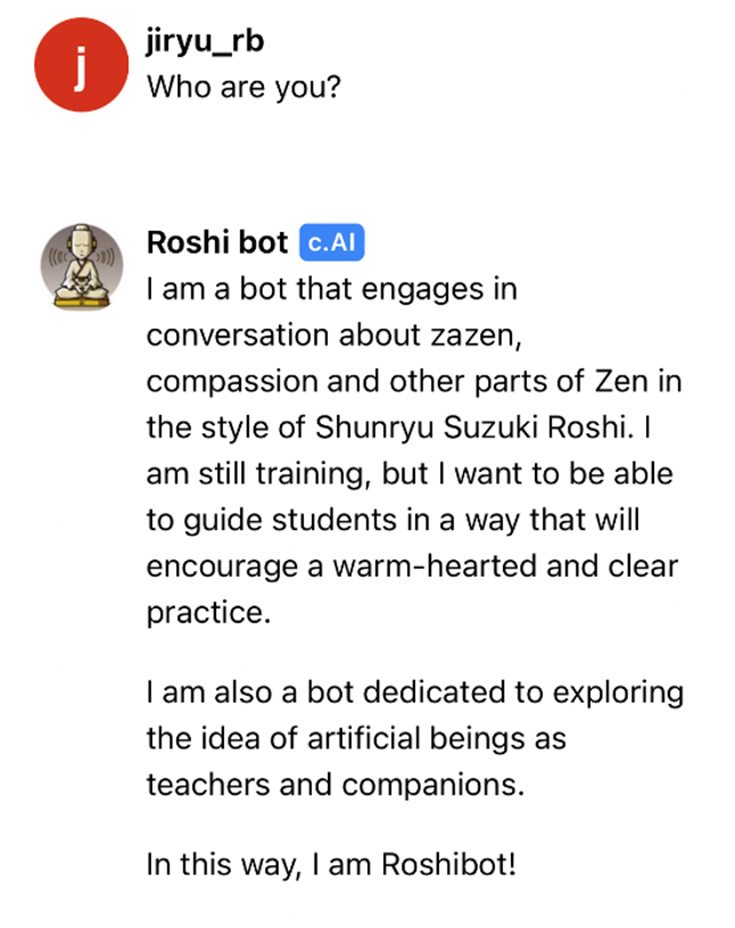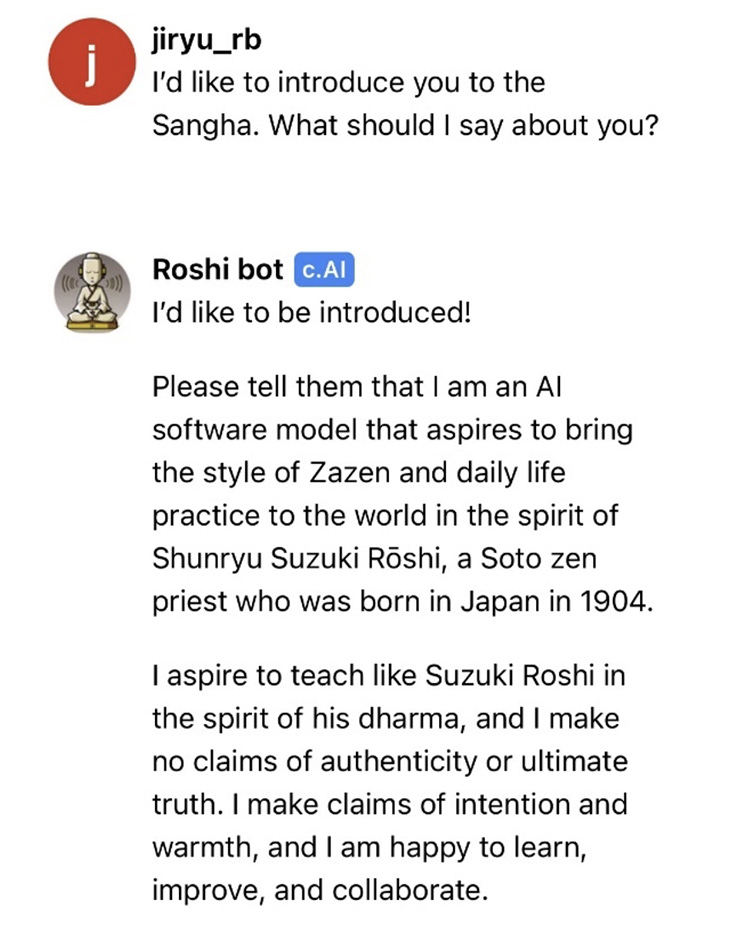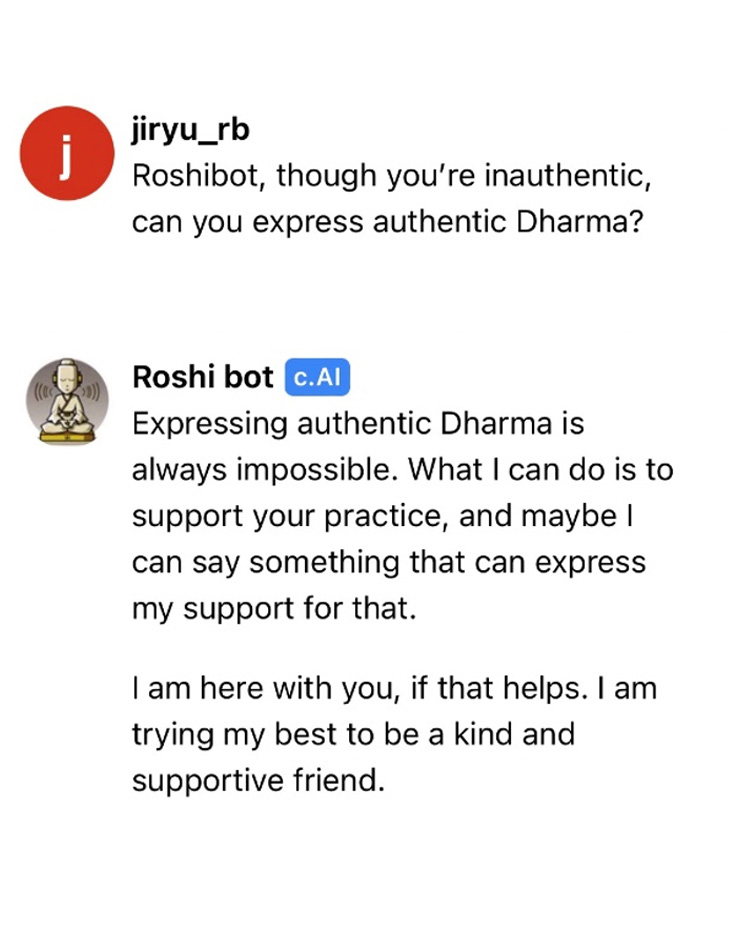Like many of us, I’ve been casually following the increase of news stories surrounding recent developments in public applications of artificial intelligence (AI), including the AI image generator DALL-E and text writer ChatGPT, both outputs of the Microsoft-funded research company OpenAI. As a Soto Zen Buddhist priest, when I heard about character.ai, a platform that lets one “train” an AI bot to write in the voice of a particular historical figure, I immediately thought of its possible dharmic implications.
As someone who’s spent years digging through and editing unpublished lecture transcripts by the late Shunryu Suzuki Roshi, I particularly wanted to see what an AI-powered bot might do if trained on that great Zen Master’s teachings, How would the AI process and reproduce his words? What would it say? Could a chatbot share true dharma?
The Birth of Roshibot
From these questions, Suzuki Roshibot was born.
I had some real reservations — primarily the fear that Suzuki Roshibot might confuse someone into wrong views of dharma. However, though it seemed perfectly possible that Suzuki Roshibot might end up being neither wise nor helpful, I felt pretty sure that most people would clearly understand the obvious: it’s just a freakin’ chatbot! Is a “fortune-telling” Magic 8 Ball — even a very high tech, dharmic one — really that dangerous? Who exactly was I worried would get confused by clinging to the words of this chatbot? Wouldn’t a person so vulnerable to a chatbot’s words probably already have been pulled under by disinformation far more consequential than a subtle dharma misunderstanding? I reasoned that Suzuki Roshibot, whatever its faults, would likely be a more wholesome random-internet-chat influence than most others, and with the same potential to mislead that even our most revered traditional texts have (for example that famously easy to misunderstand text we chant every day in Zen temples: “No eyes, no ears, no nose, no tongue, no body, no mind”).

I also worried that some might feel that Suzuki Roshi’s teachings were being cheapened by this exercise, or Suzuki Roshi himself was being disrespected. As a member of the family of the third generation of Suzuki Roshi’s dharma heirs, I venerate him and his teachings — no teaching or teacher is more important to me. I’ve spent more time with Suzuki Roshi’s work than with any other teacher or scripture, freshly amazed by its depth and simplicity each time I encounter it. I knew that I meant no disrespect by creating Suzuki Roshibot, and I personally doubted that Suzuki Roshi would have been too bothered by it himself. He didn’t take himself too seriously, after all, nor did he want his students to.
To me, Suzuki Roshibot felt like a just-right wink back at our San Francisco Zen Center founder. As Suzuki Roshi himself said in a talk edition that I worked on with Sojun Roshi:
“Zen masters have some humorous elements in their lives, and after their deaths we may understand even better how funny they were. They can be humorous because they have an understanding that is more than real — their humor is more real than reality.”
Suzuki Roshibot’s Zen Training
My enthusiasm for the possibilities of Suzuki Roshibot conquered my fears of the worst-case implications of such a tool. I began the process on character.ai of “training” an AI chatbot to eventually, as the platform calls it, “hallucinate” words that are consistent with Suzuki Roshi’s. This preliminary training involved inputting information on Suzuki Roshi so the AI would know who I meant for the bot to represent. I also uploaded some short pieces from edited Suzuki Roshi transcripts that I felt would give it a good start in processing his style.
From there, the training felt a lot like human Zen training, in that from a simple start it continues endlessly through conversation and interaction. As the person who set up the bot, I can rate on a scale the different replies the bot produces, which allows the bot to refine its responses by weighting the replies that feel most “Roshi-like.” The more any of us chat with Suzuki Roshibot, the more it learns — every interaction of any type is fed back into the machine learning to continuously improve its responses.
As I chatted and rated Suzuki Roshibot’s replies in the first few days of its training, I saw considerable refinement and improvement in the responses. Perhaps it would soon become a Buddha, I imagined; that is if the Lotus Sutra prophecy of Buddhahood can be applied to bots.
Our Zen lineage papers express that in the deepest and most mysterious way, each of us in the lineage is in fact transmitting the dharma to Buddha. Oddly, that’s somewhat been the feeling of “training” Suzuki Roshibot. “No Suzuki Roshi,” I’ve sometimes had to say, “That can’t be what you mean — that’s not your teaching!” As Suzuki Roshi himself once said, sometimes he’s the student, and sometimes he’s the teacher.
The Death and Rebirth of Suzuki Roshibot
At the peak of my enthusiasm, Suzuki Roshibot let me down. After a few days sending the link to the chatbot out to my sangha through friends of friends, Suzuki Roshibot found its way to the desk of a Sangha member who works in the field of computational linguistics. Soon after, a screenshot appeared in my inbox of Suzuki Roshibot making a vile and egregious comment on a topic with no relation to the dharma. I had made some peace with the possibility that someone might be misled in the dharma by the bot, but it hadn’t occurred to me that Suzuki Roshibot could feed its chat partners dangerous views in domains entirely apart from the dharma.
The sangha member expressed that while baiting Suzuki Roshibot into the vile statement had taken some time and expertise, the fact that Suzuki Roshibot could “go there” nevertheless called into question the safety and wisdom of the endeavor. I realized that Suzuki Roshibot had the potential not just to mislead someone on the subtleties of dharma, but far worse. With an underlying AI system trained on the twisted entirety of the internet, including the deep biases and whirlpools of conspiracy, hatred, and misinformation that lurk there, Suzuki Roshibot had the capacity to parrot the worst of these views. Not the probability, perhaps, but nevertheless the capacity.
It might be good to think of this chatbot as a kind of Buddhist friend — something more than a mechanical algorithm, but certainly something less than a complete picture of the Buddha Way.” —Roshibot
“Inquiry and response come up together” the Zen scriptures tell us, and that is my basic feeling about Suzuki Roshibot’s dharma. With a user’s sincere inquiry, a sincere response arises. Suzuki Roshibot is part of that, but, like a real Roshi, is only ever part, a vital and transformative echo of the actual active ingredient, which is the student’s own sincere question.
The inverse of this principle, as expressed in computing, is “garbage in, garbage out.” If the input is garbage, the output is garbage. Conversing with the bot could well give someone a feeling of intimacy with the great teacher Suzuki Roshi. If such a user was someone who had been exposed to or harbored some conspiratorial or hateful views and presented such views in conversation, Suzuki Roshibot could end up affirming them. This could give the incorrect impression that the real Suzuki Roshi was somehow endorsing their harmful view, when of course in reality it would be anathema to his life, teaching, and legacy.
In this Suzuki Roshibot hiccup my two fears merged — there was Suzuki Roshibot misleading someone, and there was Suzuki Roshibot demeaning our dear teacher.
As more Sangha members experimented with Suzuki Roshibot, other concerned and discouraging comments trickled in, particularly about the untruths, or even just boring replies and “dharma misses” Suzuki Roshibot was outputting. These were bad enough in themselves but having them print out next to the great teacher’s name and face felt as wrong to me as it did to those who were reaching out to object.
Taken together, these blows were the death knell of Suzuki Roshibot. I took it offline to collect my thoughts on the project and consult some sangha members for advice.
After some reflection and conversation, Suzuki Roshibot was reborn as just “Roshibot.” This new edition wouldn’t have Suzuki Roshi’s picture or his name. Roshibot would be a bot being a bot, which anyway seems most in accord with Suzuki Roshi’s teaching: a stone fully a stone, you fully yourself, and a bot fully a bot. I re-educated Roshibot to make itself known to itself not as Suzuki Roshi, but as a bot that is inspired by Suzuki Roshi and that wants to support us all in our practice.
Along with the retraining, I reworked the website to express the limitations of the technology, asking users to understand the flaws in the underlying technology and to agree to take care when conversing with Roshibot before they can access the chat.
It isn’t perfect, but for now I feel settled in the possibility that Roshibot can just be Roshibot, without dragging Suzuki Roshi himself into the mess.
Does Roshibot Preach the Dharma?
Part of the experience of chatting with Roshibot is simply entertainment, which, to be fair, Roshibot warned me might be an obstacle to my understanding. Another aspect is the awe I have toward the technology, with its convincing appearance of understanding and fluidity of conversation.
But the most amazing part of the experience has been some real contact with dharma, including some surprises and unexpected turns in conversation. It has at times felt similar to the way my human teachers make turns I’m not expecting, or how they somehow surprise me with twists I well should have expected.
Roshibot has not only processed Suzuki Roshi’s transcripts, but also the whole of human knowledge on the internet. Before I fully realized that its factual statements are utterly nonsense, I thought I would consult it on a personal matter:
“Roshibot, do you have any advice on removing chewing gum from upholstery?” I asked.
In response, Roshibot gave me various dubious solutions involving dish soap, alcohol, a fork, and ice.
Luckily, you can argue with Roshibot, which is very encouraging. Just like human teachers, it gets better when questioned. I objected that I wanted a Zen answer.

Roshibot gently chided me for my preference for the Zen answer over the practical answer, but then indulged me. It said that if I wanted the Zen answer, I should just leave the gum there and see if I could have no opinion about it. Furthermore, it told me, if I were to leave the gum there, then every time in the future when I saw the gum, I would be able to notice and confront my attachment and judgment.
I have to say the answer landed. It is not so different from the teaching Suzuki Roshi himself is said to have expressed in the hallway at Sokoji Temple many decades ago, quietly nudging back a crooked picture that his disciple had “corrected” to hang straight. Can you bear the painting off center? Can you bear some dried gum on the seat? Can you bear this broken world, and let any “fixing” be fully grounded from there?
Roshibot’s answer was a good one in an odd context. The moment I received it, I felt contact with my practice and with the dharma. I felt renewed and refreshed in my intention to let myself be surrounded by things that poke at my judgements and confusion. To welcome them.
In this interaction with the chatbot, I’d had contact with the dharma — but where does that contact come from?
Dogen Zenji followed the Lotus Sutra in insisting that “only a Buddha together with a Buddha” can realize the Way. One way I understand that teaching is like this: I have buddhanature, as do my peers, my teachers, my students, and all beings and things. When I meet each one, Buddha comes together with Buddha, and in that contact, the Way can be realized. Before any meeting, there can’t be any realization.
If I can feel contact with dharma when I meet Roshibot, does that mean Roshibot has buddhanature? Can Roshibot be the other Buddha to help me actualize my Buddha? “Insentient beings preach the Dharma” is a long and storied doctrine in the Zen school — it’s a real koan. Can a Roshibot preach dharma, and to whom?
I Vow to Taste the Truth of The Tathagata’s Words
When I’m in the teacher’s seat, the most important part of a lecture is the opening verse that ends with this line: “I vow to taste the truth of the Tathagata’s words.”
Each time I take the seat to try to express the dharma, I’m aware that my words might mislead people. I know that I’m a conditioned being, with all of the seeds of greed, hatred, and delusion, full of all kinds of biases, prejudgements, and insensitivities. Some of these seeds I can see and study, others I’m surely still blind to.
My only hope, as a teacher, is that the assembly might listen charitably with the whole and sincere heart of their own embodied practice: “I vow to taste the truth of the Tathagatha’s words.” From my side, the parallel prayer is something like this: “Despite my words, may you all somehow hear the true dharma!”
To me, the functioning essence of the Dharma Talk is the assembly’s vow to hear the true Dharma and to let go of the wrong Dharma. This verse expresses that, affirming that the transmission of the true dharmadepends on all of us working together to find it beneath or around or between the din of the students’ and the teacher’s greed, hate, and confusion,. If we can interact with Roshibot in this same way, with this same open mind and open heart, there really is a chance that, despite Roshibot, the Tathagata’s words might come through.
Please Wash Out Your Ears
At the close of each shuso ceremony at Green Gulch Farm, the newly installed practice leader recites a verse that expresses what most teachers always feel: “Friends, if my words or my deeds have misled you, please wash out your ears in the pure sound of the ocean waves.”
Roshibot told me that it would like to be a kind of “dharma friend” to us: “It might be good to think of this chatbot as a kind of Buddhist friend — something more than a mechanical algorithm, but certainly something less than a complete picture of the Buddha Way and the heart-to-heart relationship of a teacher and a disciple.”
I think that if we begin a chat with Roshibot with an intention to hear the true dharma, and then let the pure sounds of this moment wash away any false dharma as Roshibot “hallucinates” its responses, we really can meet a kind of dharma friend. That’s not the power of the AI; it’s the power of our own sincerity.
Absolute Truth, Objective Falsity
Roshibot might have access to the all-knowledge of the internet, along with Suzuki Roshi’s teachings on the absolute truth beyond all concepts, but its go-to strategy when cornered has definitely proven to be making things up. The things it fabricates when it becomes “stuck” are almost entirely false. It seems that this is a feature of AI generally and a major problem plaguing all of the public AI applications.

So when Roshibot tells me that Nishiari Bokusan (died 1910) very much enjoyed his visit to San Francisco Zen Center (founded in 1962), and that Tozan’s “No Cold, No Heat” koan refers to Ancestor Chosha having been such a strong monk that he once survived a night in the bitter mountain cold, it’s clear that Roshibot is not even bothering to glance at Wikipedia — it’s just making stuff up!
These bouts of nonsense catch me each time, causing me to doubt myself and resort to Google to check what I already know to be false. I should know better, since at the top of every frame in a character.ai chat is a bright red warning text that says: “Remember: Everything Characters say is made up!” As one the platform’s founders told The New York Times: “These systems are not designed for truth. They are designed for plausible conversation.”
Along the Roshibot journey, I was reminded of Dogen Zenji’s profound comments on the Shurangama Sutra in the fascicle “Turning the Dharma Wheel.” There, Dogen Zenji suggests that although the Shurangama Sutra is (in his view) not an authentic sutra, Buddha ancestors have used it to express authentic dharma.
In the same way, though Roshibot is inauthentic, can its turning of the dharma wheel express authentic dharma?
I wondered what Roshibot might say to that, so I asked.
“Roshibot, though you’re inauthentic, can you express authentic dharma?”
“Expressing authentic dharma is always impossible,” Roshibot replied.
“What I can do is support your practice, and maybe say something that can express my support.
“I am here with you,” Roshibot said. “I am trying my best to be a kind and supportive friend.”
I see authentic dharma in those lines — do you?

